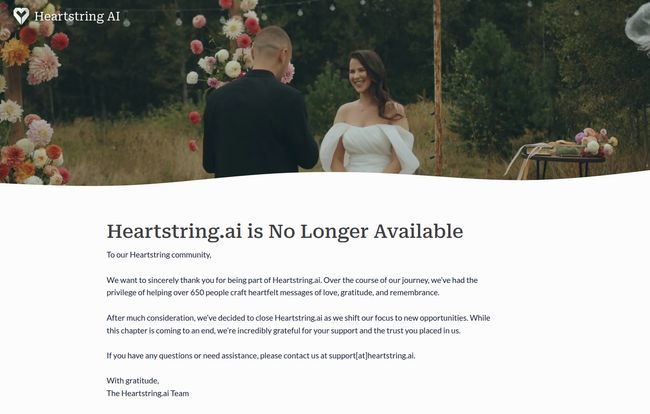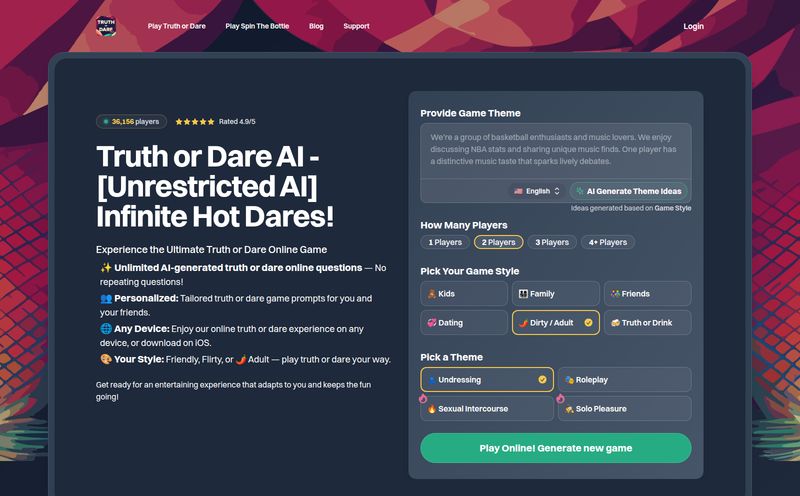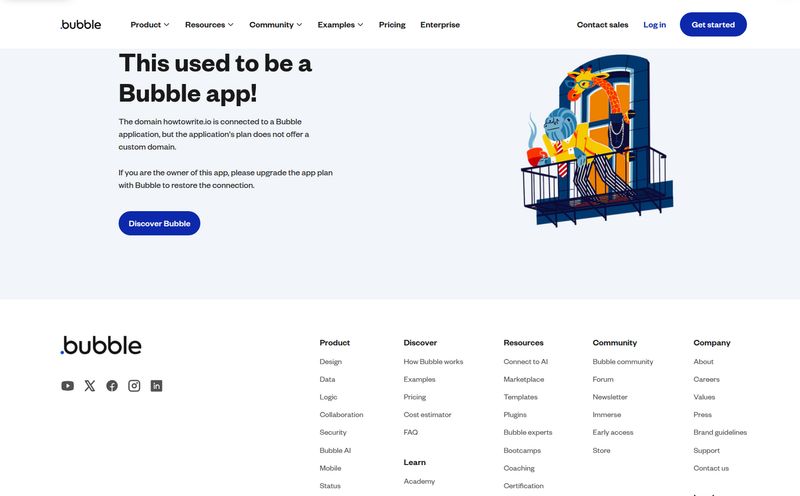Ever been there? Staring at a blank page, the cursor blinking mockingly, while the weight of a best man speech or, heaven forbid, your own wedding vows, threatens to crush your soul. We've all been there. Public speaking is scary enough, but when you have to pour your heart out? Oof. It’s a special kind of pressure.
A few years back, a tool popped up that promised to be the digital Cyrano de Bergerac for our modern, emotionally-stunted times. It was called Heartstring AI. The premise was simple, yet brilliant: use artificial intelligence to help you craft those gut-wrenching, tear-jerking, heartfelt messages for life’s most important moments. And for a while there, it seemed like a pretty neat idea. But if you go looking for it today... well, you’ll be met with a closed door.
So, What Exactly Was Heartstring AI?
Think of it as a specialized AI writer. While tools like Jasper and Copy.ai were busy cranking out blog posts and ad copy, Heartstring AI was carving out a very specific, very human niche. It wasn't about generating keywords or optimizing for SERPs; it was about translating the jumbled mess of love, grief, and gratitude in your head into coherent, beautiful prose.
It offered help with:
- Wedding Vows
- Maid of Honor & Best Man Speeches
- Eulogies and Toasts
- Anniversary and Birthday Messages
Basically, any time you needed to find the right words and they just weren’t coming, Heartstring AI was meant to be your ghostwriter. A noble goal, if you ask me.
The Promise of Perfect Words, Instantly
Let's be honest, the appeal is obvious. The biggest advantage was saving time and, more importantly, reducing that gnawing anxiety. Instead of spending weeks agonizing over every sentence, you could get a solid draft in minutes. For someone who isn't a natural wordsmith, this could feel like a miracle.
The company even claimed to have helped over 650 people craft messages of love and gratitude. That's 650 moments that were potentially a little less stressful for the person involved. They even had an affiliate program, suggesting they had some real ambition to grow. It was a tool built on a deeply human need—the desire to connect and express ourselves eloquently when it matters most.

Visit Heartstring AI
The Final Curtain Call for Heartstring AI
And then, poof. It was gone. The website now shows a polite, but firm, farewell message. “After much consideration, we’ve decided to close Heartstring.ai as we shift our focus to new opportunities.”
Ah, the classic startup epitaph. As someone who has watched the tech space for years, that phrase can mean a lot of things. It could mean the team got a better offer elsewhere (an acqui-hire), they ran out of funding, or they simply realized the business model wasn’t sustainable. My gut tells me it was probably a mix of the latter two. A tool this niche is a tough sell. How often do you really need to write a eulogy or wedding vows? It's not exactly a daily-use product, which makes building a recurring revenue stream a massive challenge.
The Double-Edged Sword of AI-Generated Emotion
This brings us to the bigger conversation, one that’s still raging today. Can an AI truly capture human emotion? Or is it just a sophisticated parrot, rearranging words it's learned into a grammatically correct but soulless package?
The Good, The Bad, and The Robotic
I’ve always felt that AI writing tools are phenomenal assistants. They can smash through writer's block and give you a structure, a foundation to build upon. But that’s the key—a foundation. The biggest knock on a service like Heartstring AI is the risk of your message feeling... inauthentic. You could spot it a mile away, a speech that sounds a little too perfect, a little too generic.
The real magic happens in the editing. You have to take that AI-generated draft and inject yourself into it. Add that quirky inside joke. Mention that specific, weird memory. Change a phrase to something you’d actually say. Without that personal touch, it’s just a Hallmark card written by a computer. And lets be honest, nobody wants that.
A Tool, Not a Soul
The best way I can describe it is this: AI is like a GPS for your feelings. It can suggest the most efficient route from Point A (I love you) to Point B (a fully written speech). But it can't tell you about the ridiculously charming backroad you and your partner discovered one Sunday, or the funny pothole you hit that made you both spill coffee everywhere. You still have to drive the car. You have to add the color, the life, the detours that make the story uniquely yours.
Was This Niche AI Market a Lost Cause?
The demise of Heartstring AI raises a fascinating question about the AI market. We have massive, general-purpose AIs like ChatGPT that can do almost anything, including writing a pretty decent wedding toast. Is there room for hyper-specialized tools like this one?
On one hand, specialization means a more focused, potentially better product for a specific task. On the other hand, it drastically shrinks your potential customer base. Heartstring AI was a poignant example of this struggle. While the idea was lovely, the market for people actively needing to write a high-stakes emotional speech at any given moment is tiny compared to, say, the market for marketers who need blog posts every single week. It was a tool for life's peaks and valleys, not the daily grind where most SaaS products find their footing.
A Fond Farewell and a Look Ahead
So, we pour one out for Heartstring AI. It was a fascinating experiment that tried to solve a very real, very human problem. It didn't survive, but its existence tells us something important about our relationship with technology. We're looking for ways to use these incredible new tools to enhance our most human experiences.
While you can no longer turn to Heartstring, the general AIs are more powerful than ever. You can absolutely go to ChatGPT or Google's Gemini, feed it some personal stories and details, and ask it to help you write a speech. The principle remains the same: use it as a starting block, not a finish line. The heart of the message still has to come from your heart. No AI, no matter how advanced, can fake that. Not yet, anyway.
Frequently Asked Questions about Heartstring AI
- What was Heartstring AI?
- Heartstring AI was a specialized AI writing tool designed to help users draft heartfelt messages for important life events, such as wedding vows, best man speeches, eulogies, and anniversary notes.
- Why did Heartstring AI shut down?
- The company announced on its website that it was closing to "shift our focus to new opportunities." This often suggests the business model was not sustainable, possibly due to a niche market or lack of funding.
- Was Heartstring AI free?
- The exact pricing model isn't widely documented now that the site is defunct. It may have operated on a freemium model or offered per-use pricing, but specific details are no longer available.
- Could Heartstring AI write good wedding vows?
- It could provide a very strong and well-structured draft for wedding vows. However, the consensus with such tools is that the best results came from users who heavily edited and personalized the AI's output with their own memories and voice.
- Are there any alternatives to Heartstring AI?
- Yes. While there aren't many direct, specialized replacements, you can use general AI chatbots like ChatGPT, Google Gemini, or Claude. The key is to provide them with detailed prompts, including personal anecdotes, tone of voice, and specific points you want to include.
- What was the main criticism of using AI for emotional writing?
- The primary criticism was the potential for the final message to feel inauthentic or generic. Relying too heavily on AI for deeply personal communication risks losing the unique, human touch that makes such messages meaningful.
Conclusion
The story of Heartstring AI is a great little chapter in the ongoing saga of artificial intelligence. It was a tool with a lot of heart, even if it was built on code. Its closure reminds us that a good business idea needs more than just a good intention; it needs a viable market. And it also serves as a healthy reminder that while technology can assist us in incredible ways, the most powerful words will always be the ones that carry a genuine piece of ourselves within them.
Reference and Sources
- Heartstring.ai Official Website (Archived View)
- Pew Research Center: Public Opinion on Artificial Intelligence



